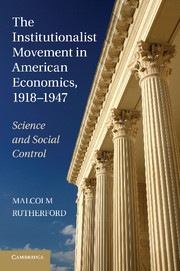Book contents
- Frontmatter
- Contents
- List of Tables
- Acknowledgments
- PART ONE INTRODUCTION
- PART TWO INSTITUTIONALIST CAREERS
- PART THREE CENTERS OF INSTITUTIONAL ECONOMICS
- 5 Institutionalism at Chicago and Beyond
- 6 Amherst and the Brookings Graduate School
- 7 Wisconsin Institutionalism
- 8 Institutional Economics at Columbia University
- 9 The NBER and the Foundations
- PART FOUR CHALLENGES AND CHANGES
- PART FIVE CONCLUSION
- Archive Collections Consulted
- References
- Index
- Titles in the series
9 - The NBER and the Foundations
Published online by Cambridge University Press: 03 May 2011
- Frontmatter
- Contents
- List of Tables
- Acknowledgments
- PART ONE INTRODUCTION
- PART TWO INSTITUTIONALIST CAREERS
- PART THREE CENTERS OF INSTITUTIONAL ECONOMICS
- 5 Institutionalism at Chicago and Beyond
- 6 Amherst and the Brookings Graduate School
- 7 Wisconsin Institutionalism
- 8 Institutional Economics at Columbia University
- 9 The NBER and the Foundations
- PART FOUR CHALLENGES AND CHANGES
- PART FIVE CONCLUSION
- Archive Collections Consulted
- References
- Index
- Titles in the series
Summary
The type of empirical research that was a part of the institutionalist program often required significant financial support for data gathering, research assistants, and other costs – costs not involved in “armchair” theorizing. In the period before World War I, there were few sources of such funding because universities themselves did not usually provide significant funding for social science research. As mentioned in Chapter 7, the Pittsburgh Survey was funded by the Russell Sage Foundation, and Commons's early work on the history of trade unionism was funded in part by the Carnegie Institution, but this was quite unusual.
In the period immediately following the end of World War I, there was a massive upsurge of optimism concerning the possibilities and social benefits that could flow from a properly “scientific” approach to the social sciences. A great deal of this optimism came from the experience of wartime planning, including the development of data sources, data analysis, policy appraisal, and the exercise of a degree of economic control. Some of the more overt expressions of this were the founding of The National Bureau of Economic Research (1920), The Institute of Economics (1922), and the Social Science Research Council (1923). All of these organizations were dominated by institutional economists or other social scientists of similar viewpoint. These developments were made possible only by a matching willingness of a number of foundations to fund social science research.
- Type
- Chapter
- Information
- The Institutionalist Movement in American Economics, 1918–1947Science and Social Control, pp. 257 - 286Publisher: Cambridge University PressPrint publication year: 2011

